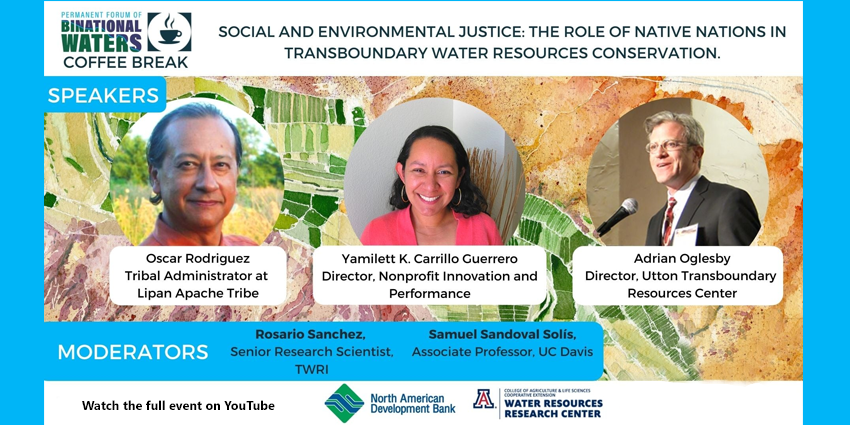On January 25, the Permanent Forum of Binational Waters held an online “coffee break” discussion forum focused on native communities’ role in transboundary water conservation and management. The session was moderated by Rosario Sanchez, Ph.D., senior research scientist at the Texas Water Resources Institute, and Samuel Sandoval Solis, Ph.D., associate professor at the University of California, Davis.
Joining Sanchez and Solis as speakers were Oscar Rodriguez, tribal administrator for the Lipan Apache Tribe; Yamilett K. Carrillo Guerrero, Ph.D., director of nonprofit innovation and performance at the International Community Foundation; and Adrian Oglesby, director of Utton Transboundary Resources Center.
The speakers discussed their viewpoints and experiences about native communities’ roles in transboundary water rights, how those roles have developed and changed over the years and what the next steps are in water conservation.
One topic of discussion was legal recognition of Indigenous populations. Oglesby and Guerrero contrasted the differences between native communities in the United States and Mexico, respectively.
Oglesby explained that the Pueblo tribes in New Mexico are recognized by the United States as sovereign nations and therefore have more rights and participation in water conservation management.
“There are lawyers, technical staff and highly educated leadership that give them [Pueblos] the tools they need to assure they can participate elegantly in [water] sharing situations,” Oglesby said.
However, Guerrero explained that native communities in Mexico are not recognized by the government, and they are overlooked as stakeholders for water rights.
“While we as Mexicans and stakeholders in the watershed have been benefitting from the huge infrastructure improvements, the Cucapá Tribe has been left out of natural resources. Their name is ‘People of the River,’ but there isn’t any river for them anymore,” Guerrero said.
Guerrero said that most native communities are not able to participate in the decision-making process surrounding water conservation and management policies. The Cucapá Tribe that Guerrero works with in Mexicali, Mexico, do not have legal water rights but have been very active and vocal in creating change. These communities focus their activism on water access instead of water ownership.
Guerrero, Rodriguez and Oglesby went on to explain that native communities have both a physical and cultural relationship with water, and that they have an ancient knowledge of water management and conservation. Guerrero said that for most native communities, Mother Nature is the owner and creator of the water, and it is native communities’ responsibility to care for and sustain the resource for those downstream and future generations.
While there are situational differences in native communities’ roles in water rights in the United States and Mexico, each of the speakers agreed that society is progressing and focusing on equity, inclusion, diversity and sustainability. Guerrero, however, said that society isn’t where it needs to be yet — but the climate may change that.
“Climate change will be a stress test to every legal, economic and state system,” she said. “Drought forces everyone to choose a side and reach a position; we have to make decisions with everyone in mind.”
Sanchez said that getting society where it needs to be — and involving everyone, including native communities, in the process — will require social, economic and political perspectives and working together.
“We need to build trust, we need to build relationships, we need to include, we need to consider stakeholders, because the challenges we have right now — it’s the least we can do. There is no other way.”


